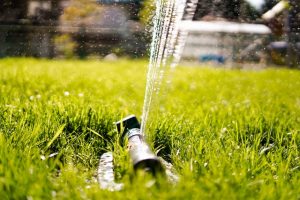Causes of Foundation Damage: Will Watering My Lawn Weaken My Building’s Foundation?
 The main causes of foundation damage can often be hidden in routine activities such as watering your lawn. That’s because most homeowners take yard drainage, downspouts, and lawn maintenance for granted. Due to this oversight, water continuously collects around the foundation of your home.
The main causes of foundation damage can often be hidden in routine activities such as watering your lawn. That’s because most homeowners take yard drainage, downspouts, and lawn maintenance for granted. Due to this oversight, water continuously collects around the foundation of your home.
Regular exposure causes the soil surrounding the foundation to become heavier. In turn, it places undue pressure on the foundation, causing it to crack and collapse. Water might even seep into your basement and flood the house when you least expect it. Hence, it’s necessary to call home restoration experts sooner rather than later.
Otherwise, you unwittingly set off a chain of events that become a homeowners’ worst nightmare.
You can save yourself from potential disaster by heeding to the signs of soil erosion and eliminating the major causes of foundation damage.
Here are some important things to consider:
Causes of Foundation Damage (and How to Prevent It)?
Rotating sprinklers and misdirected water from your hose can often come into contact with your foundation. Poor drainage, clogged pipelines, and badly constructed lawns can cause further damage as water begins to accumulate around your foundation.
Here’s a closer look at the situation:
Flowerbeds and Trees Near the Foundation Walls
Having flowers, shrubs, and trees around your foundation walls exposes it to water. Overwatering and sometimes routine watering schedules can compromise the structural integrity of your house. There are two reasons for this.
For starters, continuous contact with water can cause soil erosion and expose the foundation walls to environmental elements. Subsequently, leading to accelerated wear and tear in the long run.
Secondly, invasive roots can have an opposite effect on your foundation structure. Overgrowth might cause them to take in excessive moisture from the soil surrounding your building. The dried ground can result in an uneven surface that weakens the foundational walls.
Solution
Plant trees and flowerbeds away from your residential property. You can do this by maintaining a reasonable gap between the plants and your foundation wall. If you do have plants in place, you might replace them with smaller, less-invasive varieties.
Poor Drainage System
Drainage issues can lead to water damage even if your plants are growing at a distance. In these cases, water meant for irrigation collects around your building due to overfilled drainage lines and cracked pipes.
You might experience this problem because your drainage lines are clogged, weather-damaged, or built with low-quality construction material. Replacing and upgrading old drainage systems can prove effective in this situation.
Solution
Apart from reconstructing your drainage system, you can switch to a French drain. Install it to redirect the water away from the base of its foundation walls. That way, you can minimize structural damage caused by watering your lawn and heavy rainfall.
Imbalanced Landscape Design
Foundation walls can be susceptible to damage if your concrete driveways, walkways, and landscaping paths are designed incorrectly. One of the main causes of foundation damage includes sloped surfaces.
Gardening water might form a puddle near your house if the layout of these structures moves towards the base of your foundation.
Solution
You can resolve this issue by reconstructing these sloped surfaces by changing their direction. Alternatively, you can use foundation grading by placing smaller six-inch slopes within the ten feet of your foundation walls. Their presence can keep lawn water away from your home.
When Should You Call Home Restoration Experts?
911 Restoration of Virginia Beach offers effective water damage restoration services, mold remediation, and general reconstruction services to residents. You might need our help when the base structure of your home shows signs of decay.
Here are some tell-tale signs of structural damage:
- Discolored foundational walls with chipped/cracked paint.
- Your gardening water doesn’t seep into the soil and forms a puddle instead.
- The mulch around your flowering beds becomes displaced.
- You noticed white/grey mineral deposits outside and inside your basement walls.
- The basement starts collecting water.
- Your foundation walls begin to crumble.
- Mold infestation.
These structural issues indicated that the moisture content around your house has become too high. Asking our trained technicians to come in for a house inspection can help you identify potential hazards before it’s too late.
In addition to this, we can help you reverse all types of water damage with our professional assistance and insurance support during worst-case scenarios. We adjust our action plan according to your situation.
Final Words
In the end, the slightest contact with water can become one of the major causes of foundation damage. That’s why watering your lawn might weaken your building’s foundation. We recommend calling in local home restoration experts for consultation before things take a drastic turn. Our immediate response, result-oriented water damage restoration services, and strategic reconstruction services can save you from a great deal of trouble.
So what are you waiting for? Don’t wait for your foundation walls to crack. Call 911 Restoration of Virginia Beach today to schedule an early assessment.



